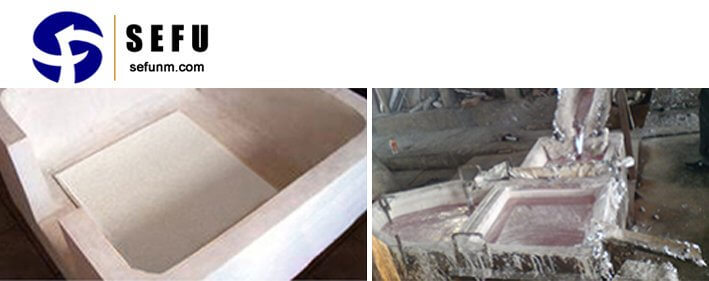Introduction:
An aluminum foundry is a crucial industrial facility where aluminum alloys are melted, cast, and transformed into a wide range of components for various applications. The foundry process involves intricate steps to achieve the desired alumina castings quality.
Steps to Make Alumina Castings with Alumina Ceramic Foam Filters:
Melting Aluminum:
The first step in the aluminum foundry process involves melting the aluminum or aluminum alloy in a furnace. The raw materials, such as aluminum ingots or recycled scrap, are charged into the furnace and heated to the appropriate temperature to achieve a homogenous liquid metal.
Alloy Composition:
During melting, alloying elements may be added to achieve the desired properties for the final casting. Different alloys are tailored to meet specific requirements, such as strength, hardness, corrosion resistance, or thermal conductivity.
Preparing the Mold:
To create the desired casting shape, a mold is prepared. The mold can be made from sand, metal, or other materials, depending on the complexity and intricacy of the casting design.
Alumina Ceramic Foam Filter Placement for Alumina Castings:
Alumina ceramic foam filters are inserted into the gating system of the mold before pouring the molten aluminum. These filters are crucial for removing impurities and providing a smooth flow of the metal into the mold cavity.

Pouring the Molten Aluminum:
The molten aluminum is carefully poured into the mold through the gating system. The alumina ceramic foam filter effectively traps unwanted inclusions and ensures a clean casting.
Solidification and Cooling:
Once the molten metal fills the mold cavity, it begins to solidify and take the shape of the casting. Controlled cooling is essential to prevent defects and ensure proper grain structure.
Shakeout and Finishing:
After the casting has solidified and cooled sufficiently, it is removed from the mold in a process called shakeout. Excess material or rough edges are then removed through finishing processes such as grinding, sanding, or shot blasting.
Special Qualities of Alumina:
High Melting Point:
Alumina, or aluminum oxide (Al2O3), boasts a remarkably high melting point of approximately 2,072°C (3,762°F). This property makes it an ideal material for foundry applications where extreme temperatures are encountered during the casting process.
Excellent Thermal Conductivity:
Alumina exhibits exceptional thermal conductivity, ensuring efficient heat transfer during the melting and casting stages. This property contributes to uniform solidification and reduces the risk of defects in the castings.
Chemical Inertness:
Alumina is highly resistant to chemical corrosion and does not react with molten aluminum or most other metals. Its chemical inertness ensures that it does not introduce impurities into the casting, maintaining the integrity of the alloy.
Mechanical Strength:
Alumina possesses excellent mechanical strength, making it suitable for use as a ceramic foam filter. Its robustness allows it to withstand the pressure and temperature of the molten aluminum during the filtration process.
Conclusion:
The aluminum foundry process involves intricate steps to produce high-quality alumina castings and other aluminum alloy components. Alumina ceramic foam filters play a vital role in ensuring the cleanliness and integrity of the castings. The special qualities of alumina, such as its high melting point, excellent thermal conductivity, chemical inertness, and mechanical strength, make it an indispensable material in the foundry industry. Through the use of alumina and advanced casting techniques, the aluminum foundry sector continues to produce a wide array of components that contribute to various industries worldwide.

